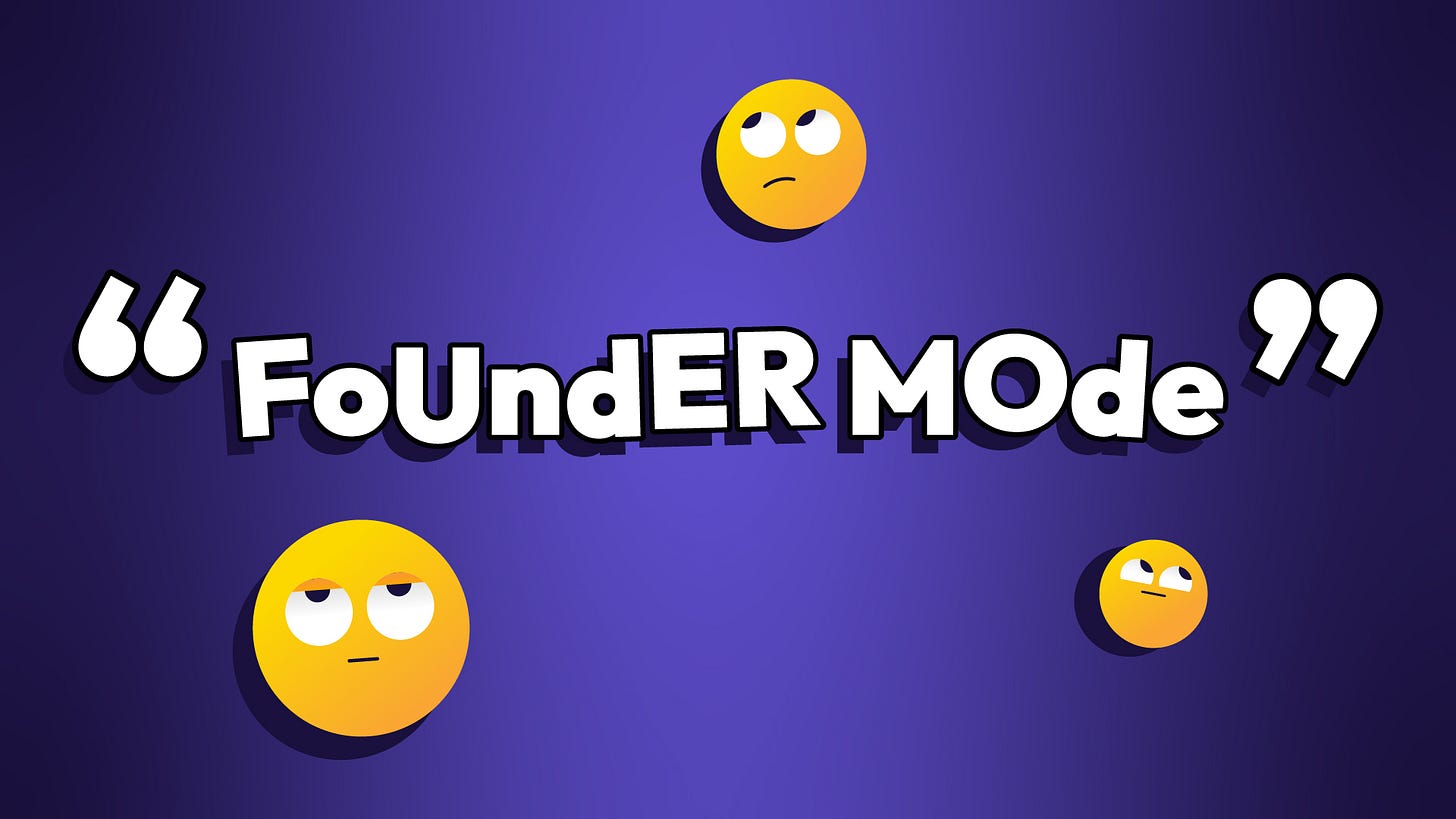📓 The Creativ Brief: Self-Important Founder Mode
Runway AI partners with Lionsgate. FTC pursues big tech. Live sports licensing wars. Audio ad trends. Targeting memes.
“Founder Mode” is the latest self-important Silicon Valley buzzword making headlines while not explaining a damn thing.
The premise of ‘Founder Mode’, based on a talk by AirBnB founder Brian Cheskey and published in a blog post by Y Combinator co-founder Paul Graham, claims that founder-led companies are superior to manager-led companies.
In Graham’s view, typical managerial business wisdom of “hire good people and give them room to do their jobs” is wrong. He posits there exists two modes in business, ‘Founder Mode’ and ‘Manager Mode’.
In founder-mode, founding CEOs are micro-managers, interact with the entire company to ensure quality, dismiss the traditional business hierarchy of direct reports, and limit the autonomy of employees which achieves outsized success. Meanwhile, Manager Mode tells their direct reports what to do, do not engage in detailed minutia, and leave the work up to their reports to figure out, leading to poor performance.
He cites Steve Job’s annual retreats where he’d invite the 100 most valued employees irrespective of org title as well as Airbnb’s recent revenue numbers as an example of Founder Mode success. Graham then accuses traditional managers that practice delegation of professional fakery.
Graham’s argument implies two verifiable untruths.
The first is that Founders are necessarily better business leaders. This argument suffers from selection bias. Most founders fail, 90+% in fact, to even get a company off the ground. Job’s and Chesky’s success are the exception not the rule.
The second is that traditional corporate management does not achieve success. Several companies including Uber under Dara Khosroshahi, Disney’s Bob Iger, Microsoft’s Satya Nadella, Ebay’s Meg Whitmen, and Apple’s Tim Cook represent poignant examples of professional management scaling, improving, and monetizing previously founder-led companies. Furthermore, founder-led companies still shockingly have managers that are critical to business operations.
Admittedly, Founders have two things that typical professionals do not. 1) Creativity to imagine a product or service that does not yet exist and 2) the fortitude to take personal and financial risks to see it through. That personal investment typically makes them zealots to quality, but not always.
Despite Silicon Valley’s self-idolatry, one does not have to be a founder to be a great business leader. I’ve worked with many at larger and small enterprises, from founders to senior leadership to humble coordinators.
Companies exhibit positive or negative qualities whether they are founder led or not, making the distinction between ‘founder mode’ and ‘manager mode’ meaningless.
Companies can be well governed or chaotic.
Organizations can practice transparent communication or cagey misdirection.
Company culture can be engaging or toxic.
Firms can be profitable or not.
Leaders can be inspiring or pandering.
Self-important Founders do not equal success. The secret to business success is simply giving a damn about what you’re selling and caring about the people that help make it happen.
Sincerely,
A Founder
3 Stories Dominating Media and Tech Headlines
Runway, a New York-based AI startup, has partnered with Lionsgate to develop a custom AI video production model that utilizes the studio's vast library of over 20,000 titles. This marks a significant step in the film industry, as AI tools like Runway's will be used to assist in storyboarding, special effects, and background creation, streamlining processes that are traditionally time-consuming and costly.
Why it matters: This collaboration represents the growing integration of AI in Hollywood, potentially reshaping production workflows and raising ongoing debates about AI's impact on creative industries, including copyright concerns.
The Federal Trade Commission (FTC) found that major social media and streaming platforms, including Meta, YouTube, and TikTok, engaged in extensive surveillance of consumers, including minors, collecting and sharing more personal data than users were aware of. The study revealed that these platforms profited by using this data for targeted advertising, while failing to adequately protect users, especially young people, from privacy risks.
Why it matters: There is growing call for federal privacy legislation and stricter regulations around data collection in an industry increasingly scrutinized for its impact on privacy and mental health.
DirecTV and Disney have reached a deal to restore Disney’s channels, including ESPN, after a two-week blackout.The agreement comes just in time for major college football games and the Emmy Awards, allowing DirecTV to offer more flexible, genre-specific bundles along with Disney’s streaming services.
Why it matters: This resolution reflects ongoing shifts in the pay-TV industry, with live sports remaining critical. Traditional TV bundles continue to seed ground to streaming services for licensed content.
Creativ Spotlight - Adweek, MOCEAN’s Erica Coates Feature
In her interview with ADWEEK, Erica Coates, president of Mocean, discusses how her dual roles as a mother and a C-suite executive complement each other, enabling her to excel at work while prioritizing her family, and emphasizes the importance of balance, delegation, and transparency in managing both career and home life.
Check out the feature HERE!!
Stat of the Week - Ad-Supported Audio Trends
Traditional radio remains dominant in ad-supported audio, holding 67% of daily listening time among all adults. However, for adults aged 18-34, radio’s share drops to less than half at 48%.
Podcasts have surged in popularity with this younger age group, making up over one-third (35%) of their daily ad-supported audio consumption.
As younger audiences shift towards podcasts, advertisers are increasingly redirecting their focus to digital audio platforms to capture the attention of the 18-34 demographic.
One Fun Thing - Targeting an Audience
New school or old school? There’s a multitude of ways to provide targeted advertising in today’s age, especially with the rise of AI tech. Arguments persist over whether super specific audience segments are worth spending the ad dollars on as opposed to casting a wider net.








